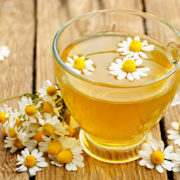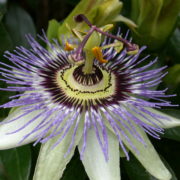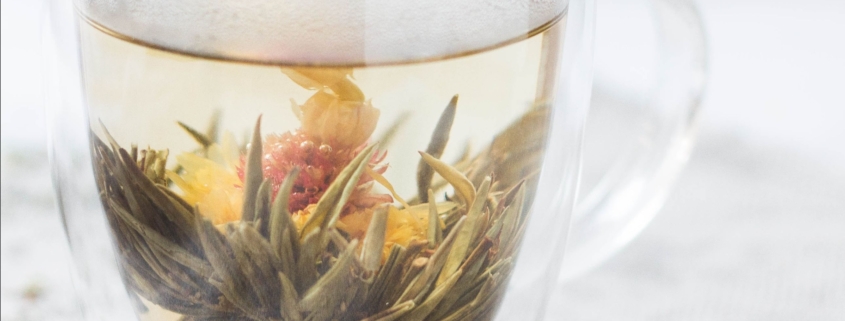Tis the Season for Tisanes (and Relaxation)
 Tisanes are herbal teas. Also called herbal infusions, these drinks are not technically “tea” because they do not contain Camellia sinensis– the plant used to make true teas like black, green and white tea.
Tisanes are herbal teas. Also called herbal infusions, these drinks are not technically “tea” because they do not contain Camellia sinensis– the plant used to make true teas like black, green and white tea.
Tisanes can be made from dried leaves, flowers, fruits, barks, roots and seeds–like chamomile, lemon balm, rose petal, mint and ginger. Flavors vary from sweet, sour, aromatic, bitter and astringent Many herbal tisanes have a relaxing effect and are loaded with antioxidants. They do not contain caffeine.
Speaking of caffeine, I am currently on day 4 of a no-sugar, no caffeine detox and am boy am I dragging! But that just goes to show how much I have been relying on these two substances to give me instant energy to get through my busy life. I knew about the dangers of sugar and caffeine. I regularly teach classes about the physiological impact of these substances, and here I am, witnessing how exhausted my body really feels beneath the surface of the constant go, go, go. The Chinese say that coffee steals energy from tomorrow to use today. It depletes one’s kidney qi, or vital energy reserves. I knew this, but like so many of us I didn’t feel that I had a choice if I was to keep going to make money and try to maintain improve my life for me and my children.
This solstice I am making it a priority to stay out of fight-or-flight mode (stress mode). Stress can be subtle, especially when it is so normalized. Even a “normal” amount of daily worry about money, chores, or getting ready for the holidays depletes our vital energy reserves.
As we enter the darkest time of the year, we are invited to surrender to the unknown. Lay down our burdens. Trust in a greater power to take care of what is most important and let the rest go so that you can rest and replenish. ‘Tis the Season for Replenishment. And relaxing herbal tisanes can help!
Here are a few of my favorite relaxing brews for snuggling up on a wintry day: 
Herbal Allies to Support relaxation, replenishment and surrender:
 |
Tulsi – also called Holy Basil. This aromatic adaptogen is relaxing, uplifting, warming and antiviral. It also strengthens our adrenal glands and helps to keep our bodies in parasympathetic (“rest & digest”) mode. It is a beloved herb in Ayurvedic medicine where it is considered a nervous system tonic. It is a great tasting tea on its own, and it pairs well with the other herbs listed below. |
 |
Hawthorn – a calming nervine & cardiovascular tonic in the rose family. Rose and hawthorn have a lot of similarities. Hawthorn and rose are both gentle, relaxing, heart-opening and taste lovely. The berries yield a sweet and sour flavor while the leaves and flowers are light and aromatic. Flowers should only be steeped for 5-10 minutes or they will become bitter. Read more about Hawthorn here |
 |
Chamomile – this well-known flower is tiny but mighty. Its is soothing and mildly sedating action helps to relieve teething pain, irritation, sleep troubles, tension headaches, stomach aches and general crankiness. It soothes the nerves and the GI tract. Its aromatic and bitter qualities improve digestion and strengthen the enteric nervous system (i.e. the nerves in our abdomens). It is also antispasmodic and anti-inflammatory. |
 |
Oats – yes, the common oat that makes oatmeal can be used to make a deliciously sweet & delicate tea that is loaded with essential nutrients like silica, magnesium, phosphorus, iron, calcium, vitamins B & A. Oats are a nervous system tonic capable of repairing damage to the myelin sheath which covers the nerve fibers. They have a reputation for strengthening the nervous system and can be used to treat depressed or anxious states of mind. The minerals they provide offer a grounding effect while strengthening the hair, nails & bones. Use either the straw or the immature dried tops for tea and be sure to steep them for several hours to extract all of the minerals. |
 |
Passionflower – Passionflower calms the nervous system, improves mood and relieves anxiety. It is one of our favorite herbs for supporting sleep. As a sedative and hypnotic, it helps with the transition into sleep. It quiets a racing mind and helps to break circular and repetitive thought patterns that may be keeping you up at night. Its ability to tone down mental chatter makes it an ally for those who are incessant thinkers and chronic worriers. Read more about passionflower here. |
 |
Lemon Balm – a cheerful aromatic plant from the mint family, lemon balm is mildly sedating but also uplifting. It won’t put you to sleep in the middle of the day or aggravate depression. In fact, it can help lift depressed states of mind, especially seasonal depression during this dark time of year. Lemon balm is indicated for stress, anxiety and hyperthyroidism & hyperactivity of any kind. It is also antiviral and its can be used topically to relieve cold sores. Lemon balm makes a great tasting tea that anyone in the family will love. Just avoid drinking lots of lemon balm if you have a hypothyroid condition. |





